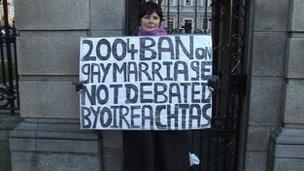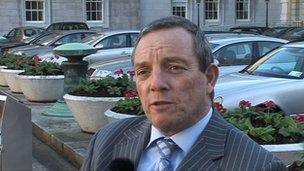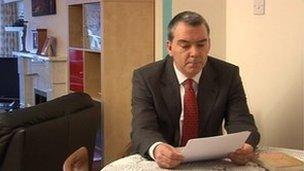Gay marriage: the debate in the Republic of Ireland
- Published

Jackie Mullins holds a placard outside the Irish houses of parliament
In the Republic of Ireland, same-sex couples can enter a civil partnership, but now the debate has moved on to whether or not they should be permitted to marry.
New laws to allow gay marriage are expected to be introduced in England and Wales before the next election in 2015.
There are no plans for similar legislation in Northern Ireland, assembly members as recently as October rejected a proposal that same-sex couples should have the right to marry.
But the issue of gay marriage is on the political radar in the Republic.
In Dublin, a group of tourists are taking photographs of Leinster House - home of the Irish houses of parliament - through the railings on Kildare Street.
Jackie Mullins is standing close by, holding a large placard.
'Human rights'
"I'm in support of the right of gay and lesbian persons to marry in this country" she said.
"I don't believe that the state should pick out people on the basis of their sexual orientation and gender and say to them, 'you're the wrong orientation so we're going to say you can't get married'.
"The state needs to protect its minorities and I feel that protecting the rights of gay and lesbian people is really important."
Same-sex couples in the Republic of Ireland have been able to enter a civil partnership since January 2011, but not marriage.
"Human rights affect people and we are talking, in this case, about the right of people to equal treatment" says Fine Gael TD Jerry Buttimer.
"If we want to see an Ireland of equals then the next logical step for me is the achievement of marriage equality."
'Personal journey'
Last year, Jerry Buttimer became the first Fine Gael Dail deputy to come out as gay after his party launched a new forum to push for gay equality.

Jerry Buttimer became the first Fine Gael deputy in the Irish parliament to come out as gay
"In my case it was about showing leadership, especially on the issue of marriage equality, and it's about having a position where I can come out and say as a gay person, I think we should have equality," he said.
"The support I have received has been tremendous, from people of different age groups and walks of life.
"It's a personal journey for everyone but it's also a shared journey where we can advance the lives of so many people."
Opponents claim that gay marriage would change what they say is now child-centred to a more adult-centred institution.
"Marriage cannot be gender neutral without changing the very nature of what it is," Dr John Murray, a lecturer in theology at the Mater Dei Institute in Dublin said.
'Traditional view'
"As far as I can see society is either going to have to promote the heterosexual view of marriage, in relation to mothers and fathers and children, or promote a gender neutral view, which will deny the other, I can't see how you can do both.
"Up until now we have promoted the more traditional view and I think that's the way to go, to try and strengthen that whilst at the same time trying to avoid any violence or bullying of gay people."
The Irish prime minister, or Taoiseach, has not outlined his own view on gay marriage.
Enda Kenny instead points to the Constitutional Convention, a group set up to examine possible changes to the Republic of Ireland's constitution.

Dr John Murray said marriage "cannot be gender neutral"
Same sex marriage is at the top of the list.
Mr Buttimer said: "I believe that the Constitutional Convention is the forum within which to initiate the debate and to make a recommendation and hopefully it will make that recommendation."
He added: "Leading on from that is the need to have a referendum campaign which will have a debate, a discussion and ultimately a vote and it will be the democratic will of the people that will be the ultimate decision at the end of the day."